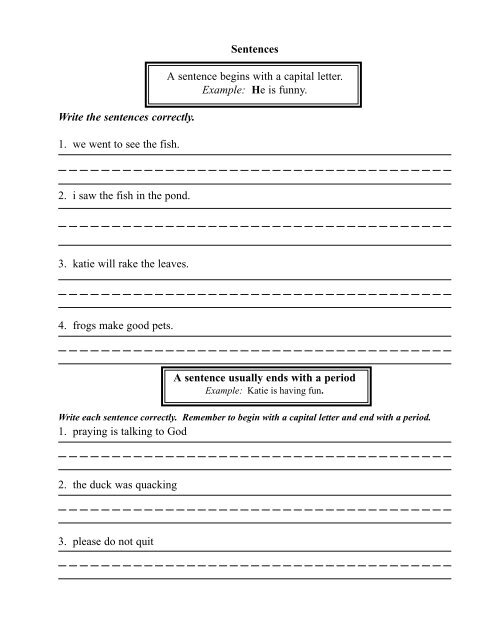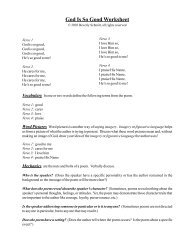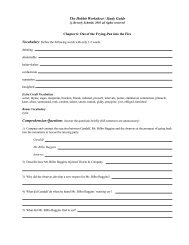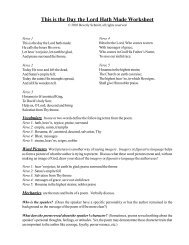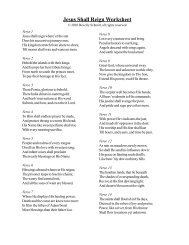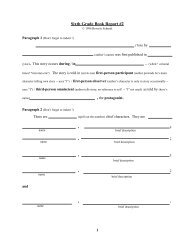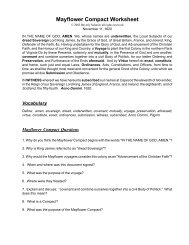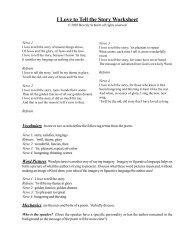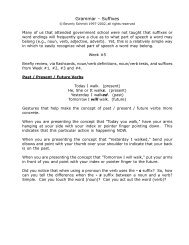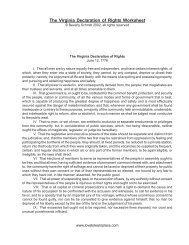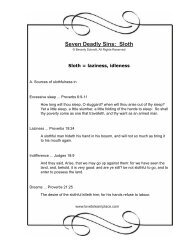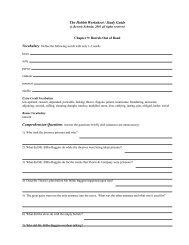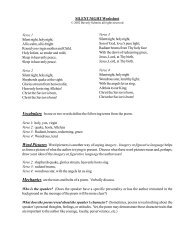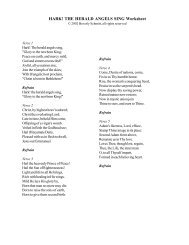Sentences A sentence begins with a capital letter. Example: He is ...
Sentences A sentence begins with a capital letter. Example: He is ...
Sentences A sentence begins with a capital letter. Example: He is ...
You also want an ePaper? Increase the reach of your titles
YUMPU automatically turns print PDFs into web optimized ePapers that Google loves.
Write the <strong>sentence</strong>s correctly.<br />
1. we went to see the f<strong>is</strong>h.<br />
<strong>Sentences</strong><br />
A <strong>sentence</strong> <strong>begins</strong> <strong>with</strong> a <strong>capital</strong> <strong>letter</strong>.<br />
<strong>Example</strong>: <strong>He</strong> <strong>is</strong> funny.<br />
2. i saw the f<strong>is</strong>h in the pond.<br />
3. katie will rake the leaves.<br />
4. frogs make good pets.<br />
A <strong>sentence</strong> usually ends <strong>with</strong> a period<br />
<strong>Example</strong>: Katie <strong>is</strong> having fun.<br />
Write each <strong>sentence</strong> correctly. Remember to begin <strong>with</strong> a <strong>capital</strong> <strong>letter</strong> and end <strong>with</strong> a period.<br />
1. praying <strong>is</strong> talking to God<br />
2. the duck was quacking<br />
3. please do not quit
<strong>Sentences</strong><br />
A <strong>sentence</strong> <strong>is</strong> a group of words that<br />
expresses a complete thought.<br />
<strong>Example</strong>s: Saw the f<strong>is</strong>h.<br />
(Th<strong>is</strong> <strong>is</strong> only part of a thought.)<br />
Jane saw the f<strong>is</strong>h.<br />
(Th<strong>is</strong> <strong>is</strong> a complete thought.)<br />
Write yes in the blank if the group of words expresses a complete thought.<br />
Write no if the group of words does not express a complete thought.<br />
_________ 1. The f<strong>is</strong>h.<br />
_________ 2. See the boat.<br />
_________ 3. The man <strong>is</strong>.<br />
_________ 4. You can do it.<br />
_________ 5. Shoes help our feet.<br />
_________ 6. Moses loved God.<br />
_________ 7. Pond frogs and snakes.<br />
_________ 8. I put a stamp on the <strong>letter</strong>.<br />
_________ 9. Combs and brushes.<br />
_________ 10. May be lost.<br />
Write yes if the <strong>sentence</strong> <strong>is</strong> correct.<br />
Write no if the <strong>sentence</strong> <strong>is</strong> incorrect.<br />
REMEMBER: A correct <strong>sentence</strong> <strong>begins</strong> <strong>with</strong> a <strong>capital</strong> and<br />
usually ends <strong>with</strong> a period.<br />
_________ 1. I like to go to the beach<br />
_________ 2. God <strong>is</strong> just and merciful.<br />
_________ 3. we want to go home at three o’clock.<br />
_________ 4. An octopus lives in the sea<br />
_________ 5. The pup was brown and white.<br />
_________ 6. Moses was hidden in the bulrushes.<br />
_________ 7. trucks help us to move things.
<strong>Sentences</strong><br />
Circle the <strong>letter</strong> of each group of words that expresses a complete thought.<br />
1. a. A bear loves to eat f<strong>is</strong>h. 4. a. Some bears are brown.<br />
b. A bear loves to. b. Are brown.<br />
2. a. Bears are very big animals. 5. a. Baby bear cubs.<br />
b. Bears very big animals. b. Baby bears are called cubs.<br />
3. a. Have short tails.<br />
b. They have short tails.<br />
Circle yes if the <strong>sentence</strong> <strong>is</strong> a complete thought.<br />
Circle no if the <strong>sentence</strong> <strong>is</strong> not a complete thought.<br />
yes no 1. A crab <strong>is</strong> a water animal.<br />
yes no 2. Has eight legs and two claws.<br />
yes no 3. Mr. Crab has a shell.<br />
yes no 4. Some crabs can be eaten.<br />
yes no 5. Is sometimes mean.<br />
yes no 6. A white sand crab.<br />
Write th<strong>is</strong> <strong>sentence</strong> correctly.<br />
katie needs some glue
<strong>Sentences</strong><br />
Some <strong>sentence</strong>s ask a question. They begin <strong>with</strong><br />
a <strong>capital</strong> <strong>letter</strong> and end <strong>with</strong> a question mark<br />
EXAMPLE: Where <strong>is</strong> it?<br />
Copy the <strong>sentence</strong>s and add the question mark.<br />
1. Where did you go<br />
2. How did you do that<br />
3. Who said that<br />
REMEMBER:<br />
Some <strong>sentence</strong>s ask a question.<br />
They begin <strong>with</strong> a <strong>capital</strong> <strong>letter</strong> and end <strong>with</strong> a question mark.<br />
Write these <strong>sentence</strong>s correctly on the lines.<br />
1. did you find him<br />
2. who <strong>is</strong> calling me<br />
3. When did it happen
SENTENCES — QUESTIONS<br />
QUESTION: A <strong>sentence</strong> that asks something.<br />
A question ends <strong>with</strong> a question mark.<br />
Circle yes if the <strong>sentence</strong> <strong>is</strong> a question.<br />
Circle no if it <strong>is</strong> not a question.<br />
yes no 1. Why are you crying<br />
yes no 2. What can we eat<br />
yes no 3. I’m not sure<br />
yes no 4. I like to do th<strong>is</strong><br />
yes no 5. Do you want to go<br />
yes no 6. I know the answer<br />
yes no 7. Where <strong>is</strong> the dog<br />
Write yes in the blan if the <strong>sentence</strong> <strong>is</strong> complete.<br />
Write no if it <strong>is</strong> not complete.<br />
_________ 1. Mount Rushmore <strong>is</strong> a monument to four men.<br />
_________ 2. Did you know that Mount Rushmore <strong>is</strong> in South Dakota?<br />
_________ 3. Had to cut and carve the heads out of rock.<br />
_________ 4. Washington, Jefferson, Roosevelt, and Lincoln.<br />
_________ 5. All four of the men cared at Mount Rushmore were presidents.<br />
_________ 6. Do you like Mount Rushmore?
SENTENCES — QUESTIONS<br />
Make questions out of these <strong>sentence</strong>s.<br />
1. My birthday <strong>is</strong> June 30th.<br />
2. I want a doll.<br />
3. June <strong>is</strong> my favorite month.<br />
Check the word or words that frequently start a question <strong>sentence</strong>.<br />
_______ Who<br />
________ Where<br />
_______ How come<br />
_____ What<br />
_____ When<br />
______ How much<br />
_______ Why
SENTENCES — DECLARATIVE<br />
DECLARATIVE SENTENCE: A declarative <strong>sentence</strong> tells something.<br />
It <strong>begins</strong> <strong>with</strong> a <strong>capital</strong> and ends <strong>with</strong> a period.<br />
Check the declarative <strong>sentence</strong>s.<br />
_____ 1. My aunt lost her shoe.<br />
_____ 2. Will you go to the store <strong>with</strong> me?<br />
______3. Ouch! That bee stung me!<br />
______ 4. I like to read.<br />
______ 5. I liked the water slide ride at the amuzement park.<br />
______ 6. Peter, go clean your room.<br />
______ 7. It <strong>is</strong> time to eat lunch.<br />
Change these question <strong>sentence</strong>s into declarative <strong>sentence</strong>s.<br />
1. How much <strong>is</strong> the book?<br />
2. Do you like cake?<br />
3. Is it a bug?
SENTENCES<br />
A <strong>sentence</strong> that shows surpr<strong>is</strong>e, fear, or excitement<br />
<strong>begins</strong> <strong>with</strong> a <strong>capital</strong> <strong>letter</strong> and ends <strong>with</strong> an<br />
exclamation point.<br />
EXAMPLE: What a wonderful day! Ouch, it hurts!<br />
Place an exclamation point at the end of each <strong>sentence</strong>.<br />
1. <strong>He</strong>lp, I can’t get out 3. Linda, look out<br />
2. I found it 4. Wow, th<strong>is</strong> <strong>is</strong> great<br />
Place the correct punctuation at the end of each <strong>sentence</strong>.<br />
Use a period, a question mark, or an exclamation point.<br />
1. I went for a long walk 5. How can we know the way<br />
2. Did you find out the answer 6. What a smart girl<br />
3. Look how happy he <strong>is</strong> 7. May we go, too?<br />
4. God said it; I believe it 8. Oh, it hurts<br />
Circle the correction punctuation for each <strong>sentence</strong>.<br />
1. Oh look, a new toy ? . !<br />
2. What <strong>is</strong> the answer ? . !<br />
3. I love to go to the fair ? . !<br />
4. Keep away from the bear cage ? . !<br />
5. There are three snails on the trail ? . !<br />
6. The snakes are in the box ? . !<br />
7. <strong>He</strong>lp! One snake got out ? . !<br />
8. May I go <strong>with</strong> you ? . !
SENTENCE REVIEW<br />
1. Circle the <strong>letter</strong>s that need to be <strong>capital</strong>s.<br />
2. Add the correct punctuation (. ? !) marks.<br />
1. what are you looking at 4. th<strong>is</strong> <strong>is</strong> a book on jellyf<strong>is</strong>h<br />
2. wow, th<strong>is</strong> one <strong>is</strong> big 5. how long do jellyf<strong>is</strong>h live<br />
3. jellyf<strong>is</strong>h live about one year 6. help, it stung me<br />
Put in the marks of punctuation. WATCH OUT! There are two <strong>sentence</strong>s in each line.<br />
1. Seaweed <strong>is</strong> a water plant It <strong>is</strong> easy to get<br />
2. Seaweed does not have roots Do you know why<br />
3. It holds fast to rocks Some seaweed <strong>is</strong> small<br />
4. Seaweed has several colors They are beautiful<br />
Write <strong>sentence</strong>s making questions. The first one <strong>is</strong> done for you.<br />
1. How How are you today?<br />
2. When<br />
3. Where<br />
4. Why<br />
5. Who<br />
6. How much
SENTENCE REVIEW<br />
REMEMBER: A <strong>sentence</strong> <strong>is</strong> a group of words that express a complete thought. A<br />
<strong>sentence</strong> <strong>begins</strong> <strong>with</strong> a <strong>capital</strong> <strong>letter</strong> and usually ends <strong>with</strong> a period.<br />
Circle yes if the <strong>sentence</strong> <strong>is</strong> a complete thought.<br />
Circle no if it <strong>is</strong> not a complete thought.<br />
yes no 1. I am the Good Shepherd.<br />
yes no 2. The Lord <strong>is</strong> my rock.<br />
yes no 3. A bench <strong>is</strong>.<br />
yes no 4. One ship.<br />
yes no 5. The car smashed into the truck.<br />
yes no 6. The mouse’s tail.<br />
yes no 7. The girl can skate.<br />
yes no 8. The bird skings every day.<br />
<strong>He</strong>re are two <strong>sentence</strong>s together. (1) Circle the <strong>letter</strong>s that need a <strong>capital</strong>.<br />
(2) Put in the periods.<br />
1. a sea horse <strong>is</strong> a f<strong>is</strong>h it has a tail<br />
2. sea horses have one fin they eat baby f<strong>is</strong>h<br />
3. sea horses are tiny they have big eyes<br />
Write a <strong>sentence</strong> for the words: grape<br />
shell
SENTENCES — IMPERATIVE<br />
IMPERATIVE SENTENCES:<br />
An imperative <strong>sentence</strong> <strong>begins</strong> <strong>with</strong> a <strong>capital</strong> and usually ends <strong>with</strong> a<br />
period.<br />
Sometimes an imperative <strong>sentence</strong> can have an exclamation point if<br />
it shows strong feeling. For example: Be careful or you may get<br />
hurt!<br />
Imperative <strong>sentence</strong>s are commands. A king or queen, for example,<br />
frequently give imperial commands. It <strong>is</strong> best to obey quickly!<br />
Put in the correct punctuation mark (. ? !) behind each <strong>sentence</strong>.<br />
If it <strong>is</strong> an imperative (command) <strong>sentence</strong>: put on your crown, stand, and <strong>with</strong> the<br />
tone of a monarch (king or queen) say the <strong>sentence</strong>. (Do not do the <strong>sentence</strong>.)<br />
1. Will you help me wash the d<strong>is</strong>hes<br />
2. Clean your room<br />
3. Smile when you say that<br />
4. The bats have left the attic and have headed to the caves in the mountains<br />
5. Do it now<br />
6. March<br />
7. Computers can be wonderful tools<br />
8. Before you wash your face, hop three times and say “Mother may I?”<br />
9. Are your teeth brushed yet<br />
10. Run in place five times, pat your head four times lightly, and sing “Yankee<br />
Doodle” at the same time<br />
11. Are you done <strong>with</strong> your homework
Subjects/Predicates<br />
<strong>Example</strong>:<br />
Horses<br />
{<br />
eat.<br />
play.<br />
run.<br />
kick.<br />
trot.<br />
gallop<br />
DIRECTIONS:<br />
Write a number of predicates for the following subjects.<br />
Birds<br />
{<br />
.<br />
{<br />
.<br />
. .<br />
Dogs<br />
{<br />
Children<br />
Moneys{<br />
Pupils{<br />
Bees<br />
{
Subjects/Predicates<br />
<strong>Example</strong>:<br />
Birds<br />
Bees<br />
Bugs<br />
Chickens<br />
Ducks<br />
Bats<br />
Geese<br />
}<br />
DIRECTIONS: Write a number of subjects for the following predicates. Do not forget to<br />
begin each <strong>sentence</strong> <strong>with</strong> a <strong>capital</strong> <strong>letter</strong>.<br />
fly.<br />
}<br />
run.<br />
}<br />
sing.<br />
}<br />
wh<strong>is</strong>tle.<br />
}<br />
jump.<br />
}<br />
stand.<br />
}<br />
melts.<br />
}<br />
grow.<br />
}<br />
play.
}<br />
work.<br />
}<br />
bite.<br />
}<br />
float.<br />
}<br />
fall.
Proper Nouns<br />
Proper Nouns name specific people, places, and things.<br />
DIRECTIONS: Write proper nouns (names) for the following.<br />
Boys<br />
1.___________________________________<br />
Girls<br />
1._________________________________<br />
2.___________________________________ 2._________________________________<br />
3.___________________________________ 3. ________________________________<br />
4.___________________________________ 4._________________________________<br />
5.___________________________________ 5._________________________________<br />
Holidays<br />
1.___________________________________<br />
Weekdays<br />
1._________________________________<br />
2.___________________________________ 2._________________________________<br />
3.___________________________________ 3. ________________________________<br />
4.___________________________________ 4._________________________________<br />
5.___________________________________ 5._________________________________<br />
Months<br />
1.___________________________________<br />
Dogs<br />
1._________________________________<br />
2.___________________________________ 2._________________________________<br />
3.___________________________________ 3. ________________________________<br />
4.___________________________________ 4._________________________________<br />
5.___________________________________ 5._________________________________
DIAGRAMMING SENTENCES<br />
<strong>Example</strong>:<br />
Birds fly.<br />
Birds<br />
(noun)<br />
(verb)<br />
fly<br />
DIRECTIONS: Diagram the following <strong>sentence</strong>s — only the noun and verb.<br />
ALWAYS DIAGRAM THE VERB FIRST.<br />
1. Frogs leap. 2. F<strong>is</strong>hes swim.<br />
(noun) (verb) (noun) (verb)<br />
3. The wind wh<strong>is</strong>tles. 4. The thunder rolls.<br />
(noun) (verb) (noun) (verb)<br />
5. The lightening flashed. 6. The door creaked.<br />
7. The rose bloomed. 8. The bird hopped.<br />
9. The snake crept. 10. Birds sing.
DIAGRAMMING SENTENCES<br />
DIRECTIONS: Diagram the following <strong>sentence</strong>s. Only the noun and verb.<br />
ALWAYS DIAGRAM THE VERB FIRST.<br />
1. Children play. 2. Carpenters build.<br />
3. The corn grew. 4. The horse runs.<br />
5. The dog barks. 6. The man works.<br />
7. The ball rolls. 8. <strong>He</strong> teaches.<br />
9. Columbus d<strong>is</strong>covered America. 10. Capt. John Smith colonized America.<br />
11. The Romans destroyed Jerusalem.
DIAGRAMMING SENTENCES<br />
<strong>He</strong>lping Verbs: <strong>is</strong>, are, am<br />
<strong>Example</strong>:<br />
Harry <strong>is</strong> swimming.<br />
Harry<br />
(noun)<br />
<strong>is</strong> swimming<br />
(verb)<br />
DIRECTIONS: Diagram the following <strong>sentence</strong>s — only the noun and verb.<br />
ALWAYS DIAGRAM THE VERB FIRST.<br />
1. The girls are singing. 2. Flowers are pretty.<br />
(noun) (verb) (noun) (verb)<br />
3. The coal <strong>is</strong> burning. 4. Grass <strong>is</strong> green.<br />
(noun) (verb) (noun) (verb)<br />
5. Gold <strong>is</strong> yellow. 6. The teacher <strong>is</strong> tired.<br />
7. Katie <strong>is</strong> studying. 8. I am jumping.<br />
9. I am driving. 10. Iron <strong>is</strong> a metal.
Diagramming interogatory <strong>sentence</strong>s (questions) can be tricky, but they do not<br />
have to be. Look for your helping verb and any other verb in the interogatory<br />
<strong>sentence</strong> first. Then, ask “who or what did...” which will reveal the subject (noun)<br />
of the <strong>sentence</strong>.<br />
EXAMPLE:<br />
Where <strong>is</strong> Pete going?<br />
Pete<br />
(noun)<br />
<strong>is</strong> going<br />
(verb)<br />
11. Are you going? 12. Is he going?<br />
(noun) (verb) (noun) (verb)<br />
13. Am I going?<br />
(noun)<br />
(verb)<br />
<strong>He</strong>lping Verbs<br />
Present Tense<br />
[ I ] am<br />
<strong>is</strong> (singular)<br />
are (plural)<br />
Past Tense<br />
was (singular)<br />
were (plural)<br />
<strong>Example</strong>s using pronouns:<br />
Present Tense<br />
Past Tense<br />
it <strong>is</strong> it was<br />
she/he <strong>is</strong><br />
she/he was<br />
they are they were
DIAGRAMMING SENTENCES<br />
<strong>Example</strong>:<br />
<strong>He</strong>lping Verbs: was, were<br />
Harry was swimming.<br />
Harry was swimming<br />
(noun) (verb)<br />
<strong>He</strong>lping Verbs<br />
Present Tense<br />
[ I ] am<br />
<strong>is</strong> (singular)<br />
are (plural)<br />
Past Tense<br />
was (singular)<br />
were (plural)<br />
<strong>Example</strong>s using pronouns:<br />
Present Tense<br />
Past Tense<br />
it <strong>is</strong> it was<br />
she/he <strong>is</strong><br />
she/he was<br />
they are they were<br />
DIRECTIONS: Diagram the following <strong>sentence</strong>s — only the noun and verb.<br />
ALWAYS DIAGRAM THE VERB FIRST.<br />
1. The boys were running. 2. The pupil was studying.
3. The cow was grazing. 4. The lions were roaring.<br />
5. The light was shining. 6. The girls were sewing.<br />
7. The snow was falling. 8. The fox was caught.<br />
9. The books were soiled. 10. The clocks were broken.<br />
REMEMBER: When diagramming <strong>sentence</strong>s always look for the verb first. For interogatory<br />
<strong>sentence</strong>s (questions) look for the helping verb first. Then, look to see if there <strong>is</strong> any other<br />
verb that connects <strong>with</strong> the helping verb. <strong>Example</strong>: <strong>is</strong> running, <strong>is</strong> going, was coming, was<br />
going, were dirtied, was cleaned, etc.<br />
1. Were the horses trotting? 2. Was the dog barking?


